Business Regular

Winter edition of Dhaka International Yarn & Fabric Show begins tomorrow
The stage is all set for the 25th Dhaka International Yarn & Fabric Show 2026 – Winter Edition, which will be held from January 28 to 31, 2026, at the International Convention City Bashundhara (ICCB). The exhibition marks the 25th anniversary of Bangladesh’s longest-running B2B yarn and fabric sourcing platform, and it will be organised by CEMS-Global USA in association with the China Council for the Promotion of International Trade (CCPIT-TEX). As part of CEMS-Global USA’s textile series of exhibitions held across three continents, the Dhaka International Yarn & Fabric Show is regarded as one of the most established platforms for textile manufacturers and suppliers. The event will feature yarns, fabrics, denim, accessories, trims, and textile technologies, bringing together global manufacturers, suppliers, and buyers. Organisers said the event is positioned as a key sourcing platform for Bangladesh’s textile and apparel industry, which is valued at more than $47 billion and has established the country as the world’s second-largest apparel exporter. Exhibitors from multiple countries will present new innovations and sourcing opportunities, with a focus on advanced yarn technologies, sustainable fabric solutions, and textile machinery, according to the website of the showcase. The exhibition will provide opportunities for business networking, technology transfer, and market expansion, while reinforcing Bangladesh’s role as a growing global textile hub. Visitors will be able to explore functional fabrics, natural fibres, denim, embroidery, artificial leather, and home textiles. The show is designed to connect international suppliers with local manufacturers and exporters, encouraging collaboration and strengthening Bangladesh’s competitiveness in global markets. The exhibition will run daily from 10:00 am to 7:00 pm at the International Convention City Bashundhara (ICCB), with registration required for entry. Industry representatives said the show comes at a time when Bangladesh’s textile sector is expanding rapidly and diversifying into new product categories to meet global demand. The 25th edition also coincides with the 8th Denim Bangladesh exhibition, which will highlight developments in denim and casual wear. Together, the two events will cover the full spectrum of textile sourcing and production, offering buyers and suppliers a comprehensive view of Bangladesh’s capabilities. Organisers emphasized that the show’s 25-year legacy demonstrates its importance to the industry and its role in supporting Bangladesh’s rise as a major textile and apparel exporter. They said the 2026 edition will continue to strengthen Dhaka’s position as a centre for textile trade and innovation in South Asia. Written By Nibir Ayaan
Read More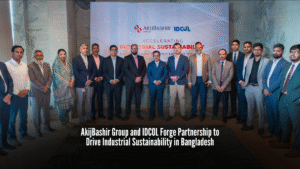
AkijBashir Group has entered into a strategic partnership with the Infrastructure Development Company Limited (IDCOL)
In a major step toward sustainable industrial growth, AkijBashir Group has entered into a strategic partnership with the Infrastructure Development Company Limited (IDCOL) to promote energy efficiency and renewable energy across its operations. The collaboration, formalized at an event held at Sheraton Dhaka, marks a significant milestone in advancing green industrial practices in Bangladesh. AkijBashir Group has been funding several sustainability projects in the last couple of years through its Energy Efficiency and Rooftop Solar financing programs funded by IDCOL. These projects have enabled the deployment of industrial rooftop solar capacity of more than 90MWp, of which over 60MWp has been deployed and has become one of the largest solar portfolios in the private sector in Bangladesh. One of the highlights of the joint venture is a pioneer project of Janata Jute Mills Ltd. in Boalmari, Faridpur, that will become the first in the world to be a fully operational jute mill using renewable energy by the first quarter of 2026. In the long-term sustainability, the Group targets to produce a renewable energy of 1,000 MWh every day by 2027. During the event, AkijBashir Group Managing Director, Mr. Taslim Md. Khan, and IDCOL Executive Director and CEO, Mr. Alamgir Morshed, emphasized the role of collaboration in the development of the future of the low-carbon industry. AkijBashir Group is determined to be 100% renewable in all its manufacturing plants by the year 2030, which is in line with its vision Beyond Tomorrow- impetus on sustainability, innovation, and industrial perfection.
Read More
World Investor Week rings the bell on financial fraud awareness
A global initiative to promote investor education and protection is underway as World Investor Week 2025 runs from October 6 to 12, led by the International Organization of Securities Commissions (IOSCO). Now in its latest edition, the campaign aims to raise awareness about the importance of financial literacy, responsible investing, and the protection of investors in an increasingly digital and complex financial landscape. The global campaign features participation from securities regulators, exchanges, financial organisations, and educators across six continents, with events tailored to national and regional contexts. Activities include public awareness drives, webinars, training sessions, and outreach campaigns designed to help investors make informed decisions and guard against fraud. A flagship feature of the campaign is the “Ring the Bell for Financial Literacy” initiative, held in collaboration with the World Federation of Exchanges (WFE). Stock exchanges around the world symbolically “ring the bell” to demonstrate their commitment to investor education and market transparency. Focus on Fraud, Digital Threats, and Investor Awareness This year’s programme includes a strong emphasis on the emerging threat of digital fraud, particularly those involving artificial intelligence and online scams. On October 7, U.S. regulators including the National Futures Association (NFA), FINRA, and the Commodity Futures Trading Commission (CFTC) hosted a webinar titled “Deconstructing to Disrupt Fraud”, which was a two-part event featuring Dr. Arda Akartuna. The session explored how AI technologies are being weaponised by fraudsters, and how regulators and investors can respond with vigilance and education. In Indonesia, the national financial regulator Otoritas Jasa Keuangan (OJK) is hosting a regional webinar on October 9 titled “Empowering Investors: Invest Wisely and Stay Safe from Fraud and Scams.” The event features speakers from IOSCO’s Committee on Retail Investors and will discuss practical strategies to improve retail investor protection. Investor education for older adults is also a priority in this year’s campaign. In the United States, the CFTC, FBI, and AARP have partnered on outreach aimed at Americans aged 50 and older, focusing on helping them identify and avoid scams. The organisers report that over 250 participants registered for this dedicated session. Global Backing and Institutional Support World Investor Week is supported by a wide range of international partners, including: The World Bank OECD G20 Sustainable Stock Exchanges (SSE) Initiative International Financial Reporting Standards (IFRS) Foundation European Fund and Asset Management Association (EFAMA) These partnerships reinforce IOSCO’s broader mission to promote not only awareness, but also long-term behavioural change among investors and institutions globally. As the global standard-setter for securities regulation, IOSCO collaborates closely with the Financial Stability Board (FSB) and the G20 to ensure that investor protection remains a key pillar of global financial integrity and stability. Building Resilience in a Complex Investment Landscape With financial markets rapidly evolving due to digitisation, AI technologies, and cross-border investment platforms, retail investors are exposed to new complexities and risks. World Investor Week serves as a timely reminder of the need for robust financial education, stronger regulatory safeguards, and proactive public engagement. As the campaign continues through October 12, organisers hope to empower individuals with the knowledge to navigate risks, detect fraud, and contribute to more resilient financial markets across all levels of society. Written By Nibir Ayaan
Read More
Bangladeshi Hotels, Resorts Win Big at South Asian Travel Awards 2025
Bangladesh’s hospitality sector received a resounding endorsement on the international stage as several leading local hotels, resorts, and tour operators were honoured at the South Asian Travel Awards (SATA) 2025, held at the Cinnamon Grand in Colombo. The glittering ceremony, widely regarded as one of the region’s most prestigious events in the travel and tourism calendar, brought together top-tier organisations from Sri Lanka, India, the Maldives, Nepal, Bhutan, and Bangladesh. A total of 53 Gold Awards and 113 Silver Awards were presented across a range of categories, recognising excellence in service, innovation, and guest experience. Bangladeshi winners spanned multiple categories, reflecting the country’s growing reputation as a destination of choice for regional and international travellers. Award Winners from Bangladesh Baywatch: South Asia’s Best New Hotel and South Asia’s Leading Beach Resort HANSA – A Premium Residence: Leading Designer Hotel/Resort Holiday Inn Dhaka City Centre: Leading City Hotel Intercontinental Dhaka: Leading Luxury Hotel Momo Inn: Leading Family Hotel & Resort and Leading Convention Center Award Platinum Grand: Leading Boutique Hotel Platinum Residence: Leading City Hotel and Leading Budget Hotel Radisson Blu Chattogram Bay View: Best Eco-Friendly Hotel Radisson Blu Dhaka: Leading Airport Hotel and Leading Meeting & Events Sayeman Beach Resort: Leading Wedding Hotel/Resort Sayeman Heritage: Leading Heritage Hotel/Resort The Palace Luxury Resort: Leading Palace Hotel The Peninsula Chittagong: Best CSR Program, Leading F&B Hotel, and Leading Business Hotel The Westin Dhaka: Leading Wellness and Spa Hotel/Resort Bangladesh Tour Group (BTG): South Asia’s Leading Inbound Travel Agent and Best Promotion Campaign in South Asia Travel Classic (Pvt.) Limited: Leading Travel Agent – Outbound Winning awards in different categories was no easy feat. Each submission underwent a rigorous selection and evaluation process. The SATA 2025 Awards were presented to organisations that embody excellence in service delivery, innovation, sustainability, leadership, and overall industry impact. During the evaluation stage, 60 percent of the marks came from the professional judges’ report cards, with the remaining 40 percent from online public voting. Judges scored submissions based on multiple criteria: service excellence, innovation and improvement, customer satisfaction, sustainability and responsibility, operational excellence and safety, sales and revenue performance, leadership and team development, and industry contribution. This year, SATA placed particular emphasis on sustainability, cultural authenticity, and digital innovation. “SATA brings together over 300 delegates from across the South Asian region to celebrate the best of South Asian hospitality brands,” said SATA President Ismail Hameed at a press conference held during the event. He added that international establishments such as the Taj Mahal Palace, as well as brands from Nepal and Bhutan, which are unique in their own right, took part in this year’s show. “From travel agents’ associations to hotel associations to tourism boards — all are part of SATA,” Hameed said. He noted that South Asian destinations hold great tourism potential, offering everything from cool weather and beaches to mountains, heritage, history, culture, food, and delicacies. Md Mohsin Hoq Himel, Secretary of the Bangladesh International Hotel Association (BIHA), who attended the event, said: “BIHA has been working with the South Asian Travel Awards in Bangladesh.” Under the overall guidance of Hakim Ali, founder of BIHA, the association has participated in the prestigious event every year, he said. Through this platform, BIHA aims to highlight the service standards of Bangladesh’s local hotels and resorts, showcasing their uniqueness and distinctiveness alongside other regional hotels, Himel added. “This year, every Bangladeshi hotel and resort has achieved remarkable positions. We extend our heartfelt congratulations to all the award winners.” According to representatives of Bangladesh’s hospitality sector, this international recognition will further advance the country’s tourism and hotel industry in the global market and strengthen Bangladesh’s brand image worldwide, he said. The first edition of the South Asian Travel Awards began in 2016 and has been organised by Highrise every year since, with the support of multiple associations and tourism bodies from across the South Asian region, according to the SATA website. The annual search for South Asia’s most outstanding travel organisations spans a month each year from March to April, calling upon industry professionals to name their preferred travel suppliers in the region who have risen above the competition and surpassed expectations, it read. “The awards programme continues to serve as a platform for nations to come together, not in competition, but in celebration of shared triumphs and brilliance.” Written by Nibir Ayaan
Read More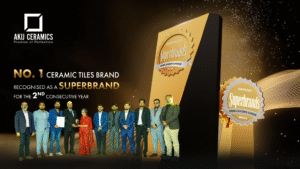
Akij Ceramics Clinches Superbrands Title for Second Time
Akij Ceramics has once again been named one of Bangladesh’s most trusted and influential brands for 2025-2026 by Superbrands, the world’s largest independent arbiter of branding. The announcement was made at a glittering ceremony held at Le Meridien Dhaka, celebrating excellence across industries. This marks the second time Akij Ceramics has received the coveted Superbrands recognition, reinforcing its stature as a leader in the ceramics industry. The company, in a statement, credited the award to its unwavering commitment to innovation, quality, and consumer trust. But beyond the accolades, Akij Ceramics has quietly shaped the way Bangladesh lives. Since its founding in 2012, the brand has evolved from a tile manufacturer into a lifestyle visionary. Its collections are not just about surfaces — they’re about stories. Each design reflects a blend of global aesthetics and local sensibilities, transforming homes, offices, and public spaces into expressions of identity and aspiration. The company’s six-year streak as winner of the “Best Brand Award” from Bangladesh Brand Forum (2019-2024) speaks volumes about its consistency and consumer loyalty. Yet, it’s the brand’s philosophy — to create beauty with purpose — that truly sets it apart. Whether it’s a minimalist matte finish for a Dhaka apartment or a bold geometric pattern for a boutique hotel in Cox’s Bazar, Akij Ceramics continues to push boundaries in design, sustainability, and lifestyle integration. With this latest milestone, the brand renews its promise: to inspire, to elevate, and to remain a trusted companion in the art of living well. Written By Nibir Ayaan
Read More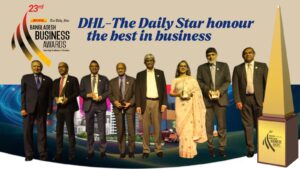
DHL–The Daily Star honour five entrepreneurs, businesses
Global logistics service provider DHL Express Bangladesh and Bangladesh’s largest-circulated English newspaper, The Daily Star, honoured five outstanding entrepreneurs and enterprises with the Bangladesh Business Awards on 23 September. The awards were given in five categories: Business Person of the Year, Best Financial Institution of the Year, Best Enterprise of the Year, Outstanding Woman in Business, and Lifetime Achievement Award. Business icon M Anis Ud Dowla, chairman of ACI Ltd, was bestowed with the Lifetime Achievement Award for his contribution to the Bangladesh economy. His story, like many others celebrated at the event, is a testament to the power of unwavering dedication. Dowla transformed an SME into ACI, one of Bangladesh’s largest conglomerates, employing more than 15,000 people. After a 27-year career in multinationals, he pioneered the local industry and continues to promote ethics, continuous learning, and youth entrepreneurship, seeing Bangladesh’s large population and rising middle class as the foundation of future growth. Ahsan Khan Chowdhury, chairman and CEO of Pran-RFL Group, was named Business Person of the Year for 2024. Under his leadership, a modest family-run agro venture grew into one of Bangladesh’s most diversified conglomerates, spanning more than 6,000 product lines and employing 167,000 people, with annual revenues exceeding $3 billion—a transformation that mirrors the country’s own economic rise. The Enterprise of the Year award went to Walton Hi-Tech Industries PLC, which has reshaped Bangladesh’s electronics market, moving from import dependence to global competitiveness. Founded in the early 2000s, Walton now produces refrigerators, televisions, and smartphones, employs thousands, exports to more than 50 countries, and symbolises the nation’s industrial diversification. City Bank was named Best Financial Institution of the Year 2024. Once considered troubled, City has emerged as one of the country’s leading lenders. Established in 1983, it now records strong asset growth, operates a vast agent banking network, runs gender-focused initiatives, and posts profits of over Tk 1,000 crore—underscoring its financial resilience and governance reforms. Sadia Haque received the Outstanding Woman in Business award for 2024. After leaving a thriving corporate career, Sadia co-founded ShareTrip, Bangladesh’s leading travel-tech startup. She turned her passion into innovation, pioneering digital booking, loyalty programmes, and fintech services. As a female founder, she champions entrepreneurship and breaks barriers in a male-dominated industry while redefining how Bangladesh travels. Finance Adviser Salehuddin Ahmed presented the awards to the winners at the Radisson Blu Water Garden Hotel in Dhaka, where Commerce Adviser Sk Bashir Uddin was also present. Congratulating the winners, Adviser Salehuddin said Bangladesh’s businesses had shown “remarkable dynamism” in expanding their reach beyond national borders. He recalled being “pleasantly surprised” to find Pran Chanachur on shop shelves as far as Fiji. “This is how Bangladesh goes far away,” he said. Ahmed called on the country’s private sector to prepare for a more competitive global environment after graduation from the Least Developed Country (LDC) bracket. “You have to be competitive, you’ll have to look at the global situation and of course the local. We definitely try to facilitate all kinds of support through policy reforms, through process simplifications and through other support instruments,” he said. “Bangladesh is on a transformation journey, and its private sector continues to be the engine of growth.” At the event, Md Miarul Haque, managing director of DHL Express Bangladesh, said Bangladesh’s private sector must evolve with agility, innovation, and collaboration to remain competitive in a fast-changing global economy. “At DHL, we are proud to celebrate the leadership that drives this progress. Tonight’s awardees are not only shaping industries but also contributing to the nation’s economic advancement and global competitiveness.” Mahfuz Anam, editor and publisher of The Daily Star, also lauded the past winners of the Bangladesh Business Awards. “These individuals represent the best of Bangladesh’s private sector—those who have built with integrity, broken barriers, and moved the nation forward.” Anam underscored that Bangladesh is nearing its graduation from LDC status, yet concerns remain about readiness. He argued that part of the answer lies in the state’s inconsistent support for the private sector. “We must distinguish between honest and dishonest businessmen,” he said. Receiving the Lifetime Achievement Award, Anis Ud Dowla said, “I am honoured and humbled by this recognition. It is truly an inspiration to strive for even greater excellence.” “This is the third time I feel honoured at this platform. In 2011 and 2017, I had the privilege of receiving awards on behalf of ACI and myself. But this Lifetime Achievement Award is profoundly moving,” he said. He ended his speech with a powerful quote: “Be punctual. Time is valuable. Not just yours, but everyone’s.” Pran-RFL Chairman and CEO Chowdhury said, “I must say, I didn’t have to do much in the beginning. It was the people behind Pran-RFL who made it happen. It’s our customers who have carried us forward.” ShareTrip CEO Haque said, “Tourism is not often seen as a key contributor to the GDP or economic growth. I hope this recognition, both for myself and for ShareTrip, marks a turning point for the industry.” Walton MD Alam called the award timely ahead of LDC graduation. He urged continued backing for local industries, saying, “Just as others say ‘Make in India’ or ‘America First’, we say: ‘Bangladesh on Top’.” City Bank CEO Arefin reflected on the bank’s transformation journey. “This was a long-anticipated recognition,” he said. “City Bank’s transformation began in 2007, from what was then considered a problem bank, with two central bank observers on its board, to now being one of the country’s leading financial institutions.” The event was attended by Sarah Cooke, British high commissioner to Bangladesh; Tapan Chowdhury, managing director of Square Pharmaceuticals; Simeen Rahman, group CEO of Transcom Group; AK Azad, chairman and CEO of Ha-Meem Group; Abdul Muktadir, chairman and managing director of Incepta Pharmaceuticals; Zaved Akhtar, president of The Foreign Investors’ Chamber of Commerce & Industry; Naser Ezaz Bijoy, CEO of Standard Chartered Bangladesh; and Syed Mohammad Kamal, country manager of Mastercard. Shaheen Anam, executive director
Read More
49 Brands Earn Superbrands Status for 2025-26
A Night of Prestige On the evening of September 20, 2025, Dhaka’s Le Meridien hotel became the epicentre of brand celebration. Superbrands Bangladesh hosted a gala to honour 49 companies that have earned the coveted Superbrands status for 2025–26. Bangladesh’s Most Trusted Brands The event brought together Bangladesh’s top corporate minds—executives, marketers, and brand custodians—who gathered to applaud the country’s most trusted and influential names. It was a night of recognition, prestige, and storytelling. Unveiling the Fifth Superbrands Volume A key moment of the evening was the unveiling of the cover for the upcoming Superbrands Bangladesh publication. This edition will profile the selected brands and serve as a reference for professionals in marketing, media, academia, and advertising. Global Legacy of Superbrands Superbrands began in the UK in 1994 and has grown into the world’s largest independent arbiter of branding. Its mission is to spotlight brands that offer both emotional and functional advantages over competitors. What Defines a Superbrand To be named a Superbrand is to be recognised for excellence, reliability, and consumer trust. These brands don’t just sell—they inspire loyalty and command premium value through their reputation. Rigorous Selection and Evaluation The selection process in Bangladesh was rigorous. A multidisciplinary Brand Council evaluated each contender across five key metrics: brand heritage, relevance, perceived quality, performance, and top-of-mind awareness. Each brand was scored out of 20. Only those with the highest marks and full compliance were invited to join the Superbrands list. The process ensures that only the most consistent and credible brands are recognised. Insights from the Brand Council Ashraf Bin Taj, managing director of International Distributions Company Bangladesh, elaborated on the jury’s approach. He emphasised that Bangladesh’s evaluation mirrors the global standards upheld by Superbrands worldwide. He noted that only brands demonstrating sustained relevance and trustworthiness make the cut. The multi-stage process filters out anything less than exceptional. Shariful Islam, managing director of Superbrands Bangladesh, addressed the gathering with a message of pride. He described Superbrands as names that people trust, respect, and feel proud to associate with. He added that these brands stand apart by honouring their values and promises. Their ability to inspire confidence and set industry benchmarks makes them worthy of celebration. Global Reach and Local Impact Globally, Superbrands has recognised over 45,000 brands across 90 countries. More than 645 publications have documented the journeys of these leading names since the programme’s inception. In Bangladesh, the fifth volume of Superbrands continues this legacy. It highlights brands that go beyond competition to represent quality, trust, and distinction in the marketplace. Meet the 2025-26 Superbrands The 49 honoured brands span industries from consumer goods and electronics to education and media. Each has carved a unique identity in the Bangladeshi landscape. Among the winners are ACI Nutrilife, Akij Ceramics, Bashundhara LP Gas, Berger Paints, BRB Cable, Channel i, and Eastern Bank PLC. These names are synonymous with reliability and innovation. Others include Energypac, Epyllion Group, Gree Air Conditioner, Hatil Furniture, Igloo Ice Cream, Jamuna TV, Mastercard, Matador Stationery, and Meghna Group of Industries. Tech and education leaders like North South University, Pathao, Samsung Mobile, and Walton were also recognised. Their impact on modern Bangladesh is both deep and wide. Retail and FMCG giants such as Shwapno, PRAN-RFL Group, Rupchanda, and SMC Condoms earned their place through consistent performance and consumer trust. The full list also features Turkish Airlines, The Daily Star, Shah Cement, Shanta Holdings, and ShareTrip. These brands reflect the diversity and dynamism of Bangladesh’s corporate ecosystem. Each brand profiled in the Superbrands publication represents a journey of excellence. Their recognition sets a benchmark for others aspiring to similar heights. Wtitten by Nibir Nahiyan
Read More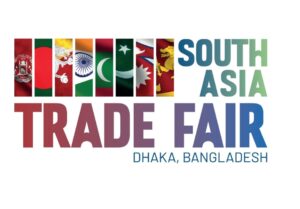
South Asia Trade Fair 2025 Kicks Off in Dhaka Today
The South Asia Trade Fair 2025 opens its doors in Dhaka today, drawing together businesses from across the region for a four-day showcase of trade and commerce. This year’s edition will feature an extensive display of products from South Asian countries, covering categories as diverse as readymade garments, textiles, gems and jewellery, cosmetics, footwear and leather items, home and kitchen appliances, processed food, and electronics. Organisers said the wide range is meant to highlight both the industrial strengths and the cultural traditions of the region. Over a hundred companies are expected to take part, representing a strong presence of entrepreneurs and firms from multiple SAARC member nations. Their participation is aimed at deepening economic ties and opening new trade opportunities among neighbouring countries. The fair is being hosted under the initiative of the SAARC Chamber of Commerce and Industry (SCCI). The Federation of Bangladesh Chambers of Commerce and Industry (FBCCI), the Ministry of Commerce, and the Export Promotion Bureau (EPB) are providing support to make the event successful. An inaugural ceremony marked the start of the fair and Commerce Adviser Sk. Bashir Uddin formally opened the exhibition at the International Convention City, Bashundhara. The event is being positioned as one of the year’s most important trade gatherings in the capital. Details of the programme were shared earlier this week at a press conference organised at the FBCCI headquarters in Dhaka’s Motijheel. Speaking at the briefing, Zulfiqar Ali Bhatt, secretary general of the SAARC Chamber of Commerce and Industry, explained the scope of the upcoming fair and outlined its objectives. According to Bhatt, the event will include business-to-business matchmaking sessions and dedicated networking opportunities designed to foster trust between entrepreneurs of SAARC nations. He added that the platform would also enable the exchange of ideas and experiences in business practices, paving the way for a stronger foundation of regional cooperation. “This will play a vital role in promoting regional trade,” Bhatt remarked, underlining the importance of strengthening intra-regional links. He noted, however, that despite significant potential, South Asian economies have not yet managed to expand their trade with each other to the levels seen in other parts of the world. The fair, he stressed, can serve as a step toward correcting this imbalance. The exhibition will bring together companies from Bangladesh, Pakistan, Sri Lanka, and Afghanistan, among others. With more than a hundred firms participating, organisers are confident the event will serve as an effective platform for businesses looking to establish or expand their footprint in South Asia’s growing markets. Md. Alamgir, secretary general of FBCCI, also spoke at the press conference, focusing on the broader vision of the Saarc Chamber. He emphasised that the institution was created to boost the region’s trade capacity and to promote collaboration across a variety of sectors. Through the fair, Alamgir said, regional potential in industries such as textiles, pharmaceuticals, processed food and agriculture, and electronics will come to the forefront. At the same time, the exhibition will not only highlight economic strengths but also showcase the rich traditions and cultural identities of the SAARC member countries, creating a more holistic view of South Asia’s shared possibilities. The stakeholders hope the four-day event will set the stage for stronger commercial ties, a more connected region, and a renewed commitment to expanding trade among neighbouring economies. Written by Nibir Ayaan
Read More
Experience the Art of Perfect Flooring
Akij Ceramics has introduced the Panora series—a stunning collection of porcelain plank tiles designed for both residential and commercial environments. Panora offers streamlined proportions suited to contemporary interiors, with three sleek sizes: 20 × 80 cm, 20 × 120 cm, and 30 × 120 cm. These tiles feature designs influenced by the textures and elegance of natural wood and incorporate an anti-slip surface achieved through advanced Micro CID technology. The subtle porcelain matte finish adds refined elegance, making them ideal for living areas, bedrooms, lobbies, kitchens, and exterior spaces. Panora’s design ensures visual harmony, complementing modern décor and architectural elements with clean, linear patterns. Beyond their refined appearance and quality, Panora tiles offer remarkable design flexibility. The sleek tiles can be arranged in a variety of captivating layouts, including: Offset (Brick Pattern): Rows of plank tiles are laid parallel but slightly staggered, creating a brick-like rhythm across the floor. Herringbone: Tiles are laid at 45° angles in a zigzag pattern, creating dynamic visual movement. Double Herringbone: An enhanced version of herringbone, where tiles are arranged in two-by-two blocks, offering a bold, textured effect. Chevron: Tiles are cut at an angle to form continuous V-shaped patterns, giving a sleek, modern appeal. This versatility allows homeowners and designers to create unique flooring designs or feature areas that reflect individual style and creativity. Whether used for expansive floors or detailed accent areas, Panora stands out as a perfect fusion of function and artistry, transforming interiors into spaces that reflect both modern elegance and thoughtful design. With Panora, Akij Ceramics delivers porcelain plank tiles that combine versatility, sophistication, and contemporary style, making them a compelling choice for a variety of settings.
Read More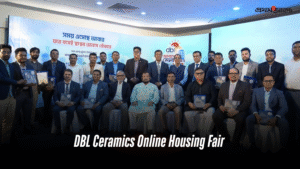
A Showcase That Brings Dreams to Living Rooms
At big housing expos, the noise is usually deafening — developers pitching, buyers bargaining, stalls glittering with scale models of shiny towers. This year, the spectacle has gone quiet. The DBL Ceramics Online Housing Fair, hosted by Prothom Alo Digital, opened on August 25 with only a small ceremony at Hotel Sonargaon, while most of the action unfolds on computer screens and phones. Over the next ten days, until September 3, prospective buyers can browse more than 256 projects from 38 housing companies on abashonmela.pro. The listings include 283,000 kathas of land, 5,230 flats, and 412,000 square feet of commercial space — all available to explore without leaving home. The fair’s slogan captures the idea simply: “The Opportunity Has Come Again. Find Your Dream Home from Home.” A Digital Market for a Stubborn Dream Bangladesh’s appetite for land and housing has never been small. In a country where urbanization runs ahead of infrastructure, the dream of owning a flat in Dhaka remains one of the most powerful middle-class aspirations. Families save for years, often with support from relatives abroad, only to find that prices have risen faster than their savings. With national elections due in February, many are waiting for signs of stability before taking the plunge. Against this backdrop, the launch of an online housing fair offers more than just marketing. It is, for many, a way to keep the dream alive. “Organising an online housing fair was a new idea in Bangladesh,” said Matiur Rahman, Editor and Publisher of Prothom Alo, at the inauguration ceremony in Dhaka. “Through it, we even gained international recognition.” He acknowledged the pressures the industry now faces. “The housing sector is going through a crisis, largely because of the political transition a year ago,” he said. “Every political change affects business. We hope that after the coming election, a new government will create the stability we need to move forward.” “The world is moving forward rapidly,” said MA Quader, Deputy Managing Director and Group CEO of DBL Group. “Whether in Dhaka or abroad, you can now search for flats and plots online. That opportunity is a gift.” For many, the gift is convenience. For developers, it is survival. With traditional sales slowing, the fair offers visibility at a time when foot traffic to offices and showrooms has dwindled. Shoppers browsing from London or Singapore can now weigh Dhaka apartments with the same ease as airline tickets. A growing diaspora, sending billions in remittances each year, is becoming a crucial customer base. “Earlier, you had to call an uncle or cousin to check on a property,” said one Dhaka-based banker. “Now you can compare projects in minutes. That changes everything.” “The online housing fair has brought a new wave of enthusiasm to the sector,” said Md Wahiduzzaman, President of REHAB. “Our members are eager to take part, and interest will only grow in the future as people can now search for their preferred flats from the comfort of home.” Cracks in the Foundations Yet the optimism is tempered. Executives across the sector point to one persistent obstacle: the Detailed Area Plan (DAP) for Dhaka, which limits the height of new buildings across 80 percent of the city. “Since the new DAP notification, the housing sector has been paralysed,” the REHAB president said. “Our members face restrictions that make new projects difficult.” A recent government meeting on potential revisions has raised hopes, but until decisions are finalised, developers remain cautious. “If the revisions are confirmed next month, businesses will be able to work again,” he added. The debate over DAP is not just technical. It touches on the core dilemma of Dhaka: a city bursting with people but running out of space. Environmentalists argue that unchecked vertical growth could worsen congestion and strain utilities. Developers counter that without high- rise flexibility, affordable housing will vanish. At the same time, bankers and financiers know the larger picture cannot be ignored. Loans are harder to secure, construction costs remain high, and global uncertainties feed into domestic anxieties. Still, the fair pushes ahead, offering a window into what is possible when policy, finance, and consumer demand align. A Ballroom of Deals and Dreams The launch night itself mixed hard economics with ceremony. Executives from IPDC Finance, Eastern Bank, Hatil, Angan Developments, Chhuti Resort, Haque Home and Builders, Onward Developers, and Shopnonibash Group took the stage. Their speeches circled back to the same themes: resilience, innovation, and the promise of stability. “I am very optimistic,” said Quader of DBL Group. “After every night comes the morning and sunrise. We are waiting for that day.” The fair’s format reflects this optimism in action. Visitors logging on to abashonmela.pro can sift through offerings ranging from compact apartments to sprawling land plots. They can compare financing packages from Eastern Bank and IPDC Finance. They can weigh furniture solutions from Hatil or imagine a holiday escape at Sea Pearl Beach Resort, a co-partner of the fair. It is part commerce, part imagination: the picture of a different life assembled from a grid of images and brochures. For some, that picture might mean a first family flat in Mirpur; for others, a gated community on the city’s northern edge. A Who’s Who of Builders The roster of participants this year reads like a directory of the sector’s leading names: Amin Mohammad Foundation, Rangs Properties, Edison Real Estate, Tropical Homes, Anwar Landmark, Asian Duplex Town, JBS Holdings, North South Group, Credence Housing, Swapnonibash Assets, Bhaiya Group, Concord Group, Nest Developments, Doyel Development Properties, Team Developers, Eminence Technologies, Unimass Holdings, Haque Home and Builders, and Pinaki Holdings. For them, the fair is not just a sales platform but a chance to signal staying power. In a fragile market, visibility matters, and buyers often look for reassurance as much as bargains. “We want to show that we’re still here,” said one developer privately. “That continuity matters in
Read More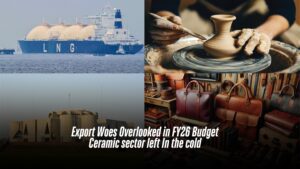
Export Woes Overlooked in FY26 Budget Ceramic sector left in the cold
The interim government’s Tk 7.9 trillion budgets for FY2025-26 have drawn criticism for lacking bold measures to strengthen export-oriented sectors, including garments, leather, pharmaceuticals, and ceramics—key drivers of Bangladesh’s economy. Despite persistent demands from businesses, the budget offers no concrete plans to modernize ports, ensure stable gas and electricity supply, or reduce logistical hurdles that cripple competitiveness. The leather sector, struggling with compliance and environmental challenges, finds no support for factory upgrades, while pharmaceuticals—a growing export segment—receive no incentives for R&D or market expansion. Similarly, the ceramic industry, which relies on imported raw materials, sees no relief from high production costs. With private investment stagnant and unemployment high, industry leaders argue that the budget missed a crucial opportunity to implement structural reforms, widen the tax net, and boost global competitiveness—essential steps for sustaining export growth and economic stability. Youth Job Crisis, Poverty Fight Missing in Action The interim government’s first budget has failed to address the core grievances that sparked July 2024’s mass uprising — unemployment and inequality. Despite 20% graduate unemployment and 30% youth disengagement from work or education, the budget offers only token funds for self-employment schemes without structural solutions. Social safety nets saw marginal increases, while allocations for education and health have remained stagnant. With 40 million below the poverty line—and a World Bank warning of worsening poverty—the budget lacks comprehensive anti-poverty strategies. Economists describe it as a “stopgap budget” that maintains the status quo rather than addressing the employment crisis that fueled last year’s protests. The absence of bold job creation measures suggests continued economic discontent among the youth. Budget Targets Overly Ambitious: Economists Economists have raised concerns over Bangladesh’s proposed FY2025-26 budget, calling its revenue, growth, and inflation targets unrealistic given current economic challenges. While noting some positive measures like reduced VAT on LNG and lower advance taxes, they highlighted structural weaknesses in tax administration and insufficient focus on job creation as key risks. Revenue & Inflation Doubts The revenue collection goal was seen as unattainable without tackling tax evasion, while inflation projections were deemed too optimistic amid persistent price pressures. Reforms Missing Experts pointed to a lack of meaningful reforms in customs, logistics, and labor markets, with particular concern over stagnant education and healthcare spending despite their importance for long-term growth. Implementation Challenges While some trade facilitation efforts like the National Single Window were acknowledged, economists warned that bureaucratic inefficiencies and resistance to change continue to hinder progress on critical economic reforms. Little to No Relief for Ceramic Sector The ceramic sector received no significant fiscal relief in the recently passed national budget for FY2025–26, despite its growing contribution to import substitution, employment generation, and sustainable construction, according to stakeholders. The Bangladesh Ceramic Manufacturers & Exporters Association (BCMEA) has expressed disappointment over the government’s failure to address longstanding demands, which could have reduced production costs and made locally produced tiles and sanitary ware more competitive against imports. The BCMEA had proposed that customs authorities allow up to 35% deduction during import-stage valuation for moisture, unusable chemical substances, and volatile components in imported raw materials such as China Clay (HS Code 2507.00.10) and Ball Clay (HS Code 2508.40.10). These clays, entirely import-dependent, naturally contain 30–35% wastage components, and further losses occur during processing—sometimes up to 40%. However, import duties are still calculated on 100% of the gross weight, significantly increasing costs for producers. The association also demanded the withdrawal of the 15% supplementary duty (SD) on locally produced tiles (HS Code 69.07) and the 10% SD on sanitary ware (HS Code 69.10). According to the BCMEA, these products are no longer considered luxury items but are integral building materials, widely used in both residential and commercial construction. They also play a vital role in promoting public health and environmental sustainability. “The government talks about affordable housing and sanitation for all, yet continues to impose unnecessary duties on locally made essential products,” said Moynul Islam, President, BCMEA, adding that, “If these unjustified duties are not withdrawn, local manufacturers will lose competitiveness, while consumers will continue to suffer from high prices amid inflation.” He also pointed out that the absence of incentives for value-added manufacturing contradicts the government’s broader goals of economic diversification and green growth. The sector, which heavily relies on imported raw materials, has already been hit hard by the appreciating US dollar and rising freight costs. The BCMEA reiterated that removing these fiscal burdens would not only lower production costs and market prices but also encourage further investment and expansion in domestic manufacturing, reducing dependence on imports and generating more employment. Economist Questions Budget’s Effectiveness Dr. M Masrur Reaz, Chairman of Policy Exchange Bangladesh, expressed disappointment that the proposed budget lacks clear roadmaps for structural reforms, employment generation, and investment stimulation. He pointed out the absence of bold measures to address the country’s core economic challenges. The economist described the budget’s revenue and growth targets as overly optimistic given the current political uncertainty and post-election economic climate. “Inflation may have eased slightly, but the government’s projections remain unrealistic without substantial investment and job creation,” Reaz stated. While not opposing the principle, Reaz questioned the timing of proposed salary increases for government employees, suggesting the measure may be premature given fiscal constraints. Reaz offered targeted recommendations for key sectors: Agri-business / Fast-Moving Consumer Goods (FMCG): Formalize informal trade channels and improve tax compliance. Telecommunications: Reduce tax burdens to accelerate digital inclusion. Tobacco: Maintain current tax structures to combat illicit trade while ensuring revenue stability. The economist acknowledged some positive steps including: Reduced VAT on LNG imports. Lower advance taxes on raw materials. Decreased land registration fees. However, he criticized: Increased VAT on yarn. Higher turnover taxes for loss-making businesses. Lack of initiatives for rural women’s employment. Dr. Reaz concluded that while containing some business-friendly elements, the budget ultimately fails to deliver transformative changes needed to address Bangladesh’s employment crisis and economic stagnation. The absence of comprehensive poverty reduction
Read More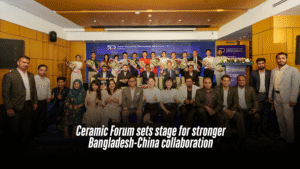
Ceramic Forum sets stage for stronger Bangladesh-China collaboration
With an emphasis on quality enhancement, efficiency improvement, and deeper cross-border collaboration, the Asian Ceramics Technology 50 Forum – Dhaka commenced on Saturday, drawing together leading figures from Bangladesh and China’s ceramics industries. Held at the Eden Grand Ballroom of Hotel Amari Dhaka, the forum was jointly organised by the Bangladesh Ceramic Manufacturers & Exporters Association (BCMEA) and Foshan Uniceramics Expo, under the theme: “Product Quality & Production Efficiency Enhancement and Investment Opportunities in Bangladesh – Win-Win Cooperation.” The day-long event served as a platform for industry leaders, technical experts, and stakeholders to explore strategies for improving production standards, reducing costs, optimizing performance, and boosting investment in Bangladesh’s ceramics sector. Participants from both countries stressed the urgency of embracing technological innovation and forging stronger partnerships to sustain growth and remain competitive in the evolving global market. Delivering the welcome address at the opening session, Mr. Irfan Uddin, General Secretary of BCMEA, welcomed the international delegates and highlighted the significance of events like this in strengthening industry ties between Bangladesh and China. “Together, let us explore new ideas, connect industries, and work toward a more vibrant future for ceramics in Asia,” he said. Mr. Irfan also acknowledged the contributions of the Chinese delegation, noting, “China’s technological advancements and global leadership in ceramics have long inspired us. Their participation here today reflects a mutual commitment to knowledge-sharing, sustainable growth, and regional cooperation.” Delivering his keynote address as chief guest, Mr. Md. Mamunur Rashid FCMA, Acting President of BCMEA and Additional Managing Director of X Ceramic Group, echoed similar sentiments. He underscored how the presence of Chinese industry leaders underscores a strong bond between the two industries and paves the way for joint ventures, technology transfer, and knowledge exchange. “Forums like this serve as a powerful platform for dialogue, innovation, and mutual growth,” he said, further highlighting Bangladesh’s investment opportunities and the government’s supportive policies and incentives for investors amid the country’s evolving socio-economic landscape. The forum’s technical sessions reflected its ambitious agenda. Technical Session 1: Product Quality & Production Efficiency Enhancement The first technical session focused on Product Quality and Production Efficiency Enhancement and was chaired by Mr. Mohd Ziaul Hoque Zico, Director of BCMEA and Deputy Managing Director & CEO of Hua Thai Ceramics Industries Ltd. Engr. Sadat H. Talukder, a consultant in the ceramic sector, and Mr. Luo Fei, a ceramic equipment technology expert from Foshan Uniceramics Development Co. Ltd., served as resource persons. Mr. Saidur Rahman Khan, Director of Operations at Akij Ceramics Ltd., and Ms. Yang Shuilan, General Manager of Foshan Lang Kun Electromechanical Equipment Co. Ltd., contributed as discussants. The session concluded with an engaging floor discussion. Technical Session 2: Cost Reduction, Efficiency Improvement & Optimization Mechanisms The second session, which explored two key topics—(i) Cost Reduction and Efficiency Improvement and (ii) Optimization Mechanisms for Tile Performance—was chaired by Mr. Mahin Bin Mazher, Advisor to BCMEA and Managing Director of X Ceramic Group. For Topic (i), Mr. Mohammad Bayazed Bashar, Chief Business Officer of DBL Ceramics Ltd., presented strategies for cost reduction and enhanced operational efficiency. For Topic (ii), Mr. Liu Zhanjie, a ceramic process and formulation technology expert from Foshan Uniceramics Development Co. Ltd., delivered technical insights on optimizing tile performance. The session’s discussants included Mr. A.K.M. Ziaul Islam, Chief Operating Officer of Meghna Ceramic Industries Ltd., and Mr. Sun Bowen, Sales Manager of Zibo Huayan Industrial Ceramics Co. Ltd.. Like the first, this session also concluded with a floor discussion. Technical Session 3: Investment Opportunities in Bangladesh The final session focused on Investment Opportunities in Bangladesh under the Changed Socio-Economic Scenario. It was chaired by Dr. Md. Anwar Ullah FCMA, former Secretary to the Government of Bangladesh. Mr. Md. Mominul Haque, Vice President of LankaBangla Investments PLC, served as the resource person for this session. Mr. Muhammad Nazrul Islam, Managing Director and CEO of Sandhani Life Finance Ltd., Mr. Li Xinliang, President of Ceramic Town Weekly and General Manager of Foshan Uniceramics Development Co. Ltd., and Ms. Joanna Sun, General Manager (Asia Market) of Tangshan Hexiang Intelligent Technology Co. Ltd., joined as discussants. Throughout the day, speakers from leading Bangladeshi companies such as Akij Ceramics, DBL Ceramics, Meghna Ceramic Industries, and LankaBangla Investments underscored the importance of strategic collaboration with China, especially in areas like technology integration, production management, and investment facilitation. The event concluded with a vote of thanks from Mr. Abdul Hakim Sumon, Senior Vice President of BCMEA and Managing Director of Excellent Ceramic Industries Ltd., who expressed gratitude to all guests, speakers, and participants for their contributions. He remarked that the forum marked a significant milestone in advancing regional partnerships and securing a sustainable future for Bangladesh’s ceramics industry. Participants wrapped up the day with a networking session over evening refreshments, celebrating the successful exchange of ideas and reaffirming commitments to long-term collaboration.
Read More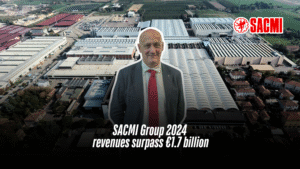
SACMI Group 2024: revenues surpass €1.7 billion
The yearly financial statement – approved yesterday, 16th May, during the Parent Company Shareholders’ Meeting – highlighted a net equity of more than one billion euros, growing margins and financial solidity. 2024 also saw the drafting of the first Group Sustainability Plan. Paolo Mongardi, President of SACMI, states: “Sustainability is the fuel of future competitiveness. We continue to invest in people and remain focused on the values that have guided SACMI’s enduring worldwide success” Imola, 17th May 2025 – SACMI closes 2024 with sales revenues of 1.728 billion euros. Despite the complex international economic and geopolitical backdrop, the company’s economic and financial fundamentals proved to be sound. For the first time, net equity exceeded one billion euros (1.055 billion, +172 million compared to 2023) while EBITDA settled at over 323 million euros and EBIT at 236 million. Net profit exceeded 200 million. These were the highlights of the Consolidated Financial Statement, presented yesterday evening, 16th May, at the Parent Company’s (SACMI Imola) Shareholders’ Meeting. “2024 was a solid year that went beyond expectations”, pointed out the President, Paolo Mongardi. “SACMI’s forward-thinking strategy rests on solid foundations and fully embraces the global drivers of digitalization and sustainability”. The year saw a continued focus on the core businesses, confirming the sterling reputation of – and customers’ confidence in – SACMI products across all sectors. In parallel with the to-be-expected slowdown in the ceramic sector – the result of international tensions and the sluggish global construction market – the Rigid Packaging, Advanced Technologies, Packaging & Chocolate sectors all performed excellently, driven by highly dynamic markets receptive to innovation. Investment remained consistently high in 2024 at 71 million euros, in line with the previous year, with a strong focus on innovation (276 new patent applications in 2024 alone, over 6,200 in the Group’s history) and training (over 94,000 hours). In parallel, SACMI confirms its role as a key player in the manufacturing industry’s ecological transition: during the year it presented innovative firing processes (e.g. electric), new process control solutions (thanks also to the acquisition of a majority share in Italvision in 2024), plus new eco-compatible standards, processes and materials in the packaging sector. “Sustainability is the key to future competitiveness”, explains President Paolo Mongardi. “We continue to invest in people by focusing on our values, which have consistently guided SACMI to worldwide success.” The green commitment is also evident at Governance level: the obligations of the new European CSRD (Corporate Sustainability Reporting Directive) were brought forward to 2024 and the first Group Sustainability Plan – an ambitious project that details actions and goals along the entire value chain, from suppliers to local communities – was drawn up. In the ESG sphere, SACMI has strengthened monitoring of indirect emissions linked to the use of its products and plants: this is part of an approach that centers on eco-design and the entire product life cycle to ensure processes are truly circular and impacts are minimized. The share of self-produced renewable energy is also growing (2.6 million kWh), the goal being to progressively decarbonize production facilities. On the employment front, the Group had a total of 4,756 employees at the end of 2024, with over 50% of new hires aged under 30. Close collaboration with universities and research facilities also continued. Ties with local communities – a part of SACMI’s DNA since its founding – became even stronger in 2024, with 90% of procurement networks consisting of local suppliers. Over the three-year period, the company also donated 2.4 million euros to healthcare, educational, safety, inclusion, sports and cultural projects. The year 2024 was a special one for SACMI, with the company reaching the milestone of its 105th anniversary. “We enter 2025 aware of not just the challenges but also the opportunities”, concludes the President, Paolo Mongardi, “with all the confidence that only a long history of innovation, solidity and responsibility can provide”.
Read More
Akij Tableware Art of Plating: Season 2 Premieres on April 25, 2025
Get ready for Akij Tableware Art of Plating: Season 2, premiering April 25, 2025, and turning food into art! Airing weekends on Bangla Vision at 8:15 PM, RTV at 7:10 PM, Deepto Television at 9:30 PM, and streaming on Chorki with new episodes every Friday and Saturday, this vibrant reality show celebrates Bangladesh’s culinary soul. Rooted in Bengali traditions of family and hospitality, contestants transform dishes like fish curries and creamy dal into visual poetry, blending heritage with modern flair. Following its 2022 debut, Season 2 brings high-energy challenges and showcases local talent, from aspiring chefs to home cooks, competing for the “Plating Maestro” title. The grand prize includes BDT 10,00,000, a professional culinary course, national media exposure, and an exclusive Akij Tableware dinner set. With a BDT 20,00,000 prize pool, runners-up and top participants earn cash, certificates, and recognition. Guided by renowned chef Daniel C. Gomez, contestants craft edible masterpieces, judged on aesthetics, technique, and culinary insight after auditions at Hatirjheel Amphitheater. Tune in to Art of Plating: Season 2 to witness a movement redefining dining as a feast for the eyes and soul, where every plate tells a story!
Read More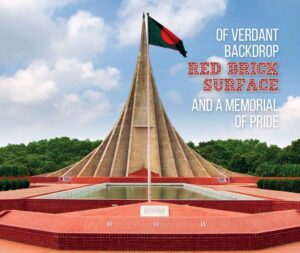
Business -Of Verdant Backdrop Red Brick Surface and A Memorial Of Pride.
Architecture, in its own language, has the power to narrate stories, forge distinctive perspectives, and evoke profound emotions. The National Martyrs’ Memorial in Savar is one of those powerful architectures that bear the history and bravery of the nation with its grandeur and glory. Located in Savar, an industrial hub on the outskirts of Dhaka, the monument stands tall as an emblem of reverence, embodying the nation’s profound gratitude to those brave souls who made the ultimate sacrifice in the pursuit of self-determination for the Bengali people. After taking a short tour around it, visitors can’t help but feel a sense of awe and pride as they contemplate the nation’s immense history and resilience. The vast landscape, the luscious greenery surrounding it, and the soaring height of the establishment will remind of its relative insignificance in the grand scheme of things. The month of March in Bangladesh is a time of remembrance and reflection. For millions of Bangladeshis, Independence Day is a day of extraordinary sentiments, containing both happiness and grief as the country earned its sovereignty 54 years ago at the cost of 3 million lives. Three phases of construction: The National Martyrs’ Memorial is designed by architect Syed Mainul Hossain (1952-2014). With a distinguished jury, including architect Muzharul Islam, a national design competition for the monument took place in 1978. (The previous attempt didn’t yield any satisfactory results.) Among 57 contenders, the young 26-year-old architect Mainul emerged victorious with his standout design. The inception of the project dates back to 1972, marking the acquisition of approximately 110 acres by the government. Of this expanse, 84 acres were dedicated to the construction of the main complex, while the remaining land was set aside for a verdant land-water greenbelt. The initial phase saw the creation of access roads, laying the foundation for subsequent development. In the second phase spanning from 1974 to 1982, significant infrastructural elements such as mass graves, helipads, parking facilities, and pavements were meticulously established. Finally, the third phase in 1982 witnessed the realisation of the main monument, along with the establishment of the greenbelt and a cafeteria, concluding the completion of this national monumental endeavour. The main monument was built by Concord in 1982 in only 89 days. In 1988, architect Syed Mainul Hossain received the Ekushey Padak, one of the highest civilian honours of the country, in recognition of his profound contribution to Bangladesh’s cultural heritage. A sneak peek into this architectural marvel: The central structure of the National Martyrs’ Memorial comprises seven pairs of triangular shapes, each representing pivotal events that propelled Bangladesh towards its independence. Starting with the outermost and shortest triangle, the structures progressively increase in height, leading up to the innermost peak. This architectural metaphor symbolises the nation’s ascent despite formidable challenges. The monument is made of concrete, in contrast with the rest of the structures and pavements, which are made of red bricks. Its design offers a multifaceted viewing experience, presenting a symmetrical pyramid-like formation when observed from afar. However, closer inspection reveals a dynamic interplay of angles and perspectives, inviting visitors to explore its intricate details firsthand. Notably, the surface of the structure is intentionally uneven, mirroring the tumultuous journey towards freedom and independence. This tactile representation serves as a poignant reminder of the sacrifices made and the resilience required to overcome adversity. The whole campus is adorned with trees, walkways, an artificial lake, and a cafeteria. Interplay of numbers: Numerology serves as a hidden vital factor behind the intricate design of the National Monument, reminiscent of ancient architectural wonders like the Athenian Parthenon, where numbers were revered as the essence of aesthetic perfection and cosmic harmony. At the heart of this establishment lies the mystical number 7, symbolising the seven pivotal movements that shaped Bangladesh’s path to independence between 1952 and 1971. The first of these 7 historical contexts is the language movement of 1952. This was followed by the United Front elections of 1954, the Constitution Movement of 1956, the Education Movement of 1962, the Six-Point Movement of 1966, the People’s Uprising of 1969, and then the final victory through the Great Liberation War of 1971. However, these 7 pillars or the number 7 also have different implications if we look at them from different facets. For example, among others, the Language Movement in 1952 contains 5+2=7; December 16, the day of independence in 1971, has 1+6=7; and there were 7 Birsreshto (war heroes) who sacrificed their lives for the cause of liberation. Written Kaniz F. Supriya
Read More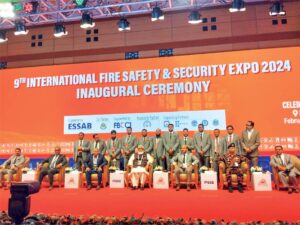
Business – Smart Fire Safety is a must for SMART BANGLADESH.
A three-day 9th International Fire Safety and Security Exhibition-2024 concluded with a focus on bolstering Bangladesh’s fire safety measures and aims to reduce fire risks, utilise modern equipment for safety, and raise awareness among the mass people. In the expo held on February 17-19, the people engaged in the industry underscored the need for amending the Bangladesh National Building Code (BNBC) 2020 as part of ensuring preventive measure of fire incidents and maintaining fire safety compliance in factories, housing and public infrastructure including mega projects. Held at the Bangabandhu International Conference Centre (BICC) in Dhaka, the expo was organised by Electronics Safety and Security Association of Bangladesh (ESSAB) in association with Bangladesh Fire Service and Civil Defence (BFSCD), Fire Fighting Equipment Business Owners Association of Bangladesh (FEBOAB), Federation of Bangladesh Chambers of Commerce and Industries (FBCCI), Bangladesh Garment Manufacturers and Exporters Association (BGMEA), Bangladesh Knitwear Manufacturers and Exporters Association (BKMEA), Bangladesh Textile Mills Association (BTMA), Dhaka North and South City Corporations, the Ministry of Commerce, and the Ministry of Home Affairs. More than 100 organisations from 30 countries including the USA, the UK, EU, China, India, the United Arab Emirates, and other Middle East countries took part in the expo. And more than 15,000 local and foreign visitors visited the expo. Salman F. Rahman, Private Industry and Investment Adviser to the Prime Minister, inaugurated the expo on February 17 while Fire Service and Civil Defence Director Brigadier General Mohammad Main Uddin, FBCCI President Mahbubul Alam and BGMEA President Faruque Hassan were present, among others. Brig. Gen. Main Uddin informed a seminar during the expo that the Fire Service and Civil Defence (FSCD) received 22,300 fire incidents per year but last year it was increased to 28,703 while on an average 150 deaths are recorded every year. In these incidents, an average loss was Tk 368 crore each year and the loss amounted to around Tk 793 crore last year. About 36 per cent fire incidents was caused by electricity last year, he added. Architect Iqbal Habib said using technology harnessing data from every level is a must to monitor and manage city infrastructure to build smart city and provide facilities to citizens. He also said if the soft copy of the building design is on the device, it will reach the fire fighters at the premises within a second. The PPP model will ensure smart safety and security solution to make sure that fire incident would not take place. Investment required for boosting the industry: With the expansion of industrialisation, the demand for fire safety and security equipment is rapidly growing in Bangladesh. But the country is still highly dependent on imported products. Industry insiders say Bangladesh has to depend on around 95 per cent import of the products. So, the country has a scope of attracting a huge investment, and also export the products meeting domestic demand for around Tk 15,000 crore market, if investors get adequate policy support from the government. ESSAB Safety Excellence Award 2024: A total of 13 organisations have been awarded at the expo for ensuring building code compliance and fire safety measures in residential, industrial, commercial buildings. Among them, Rancon Artisti Residences stood first in the residential building category, while Sheltech Rubynur stood second, and Concord Shapla third. In the Commercial Building Category, Shanta Forum, Concord MK Heritage and BGMEA Complex received the award as the First, Runner-Up and Second Runner-Up. Six companies jointly won the excellence award in the Industrial (RMG) category. Among them, Glamour Dresses Ltd. and Designtex Knitwear Ltd. were named the top winners. Tasniah Fabrics Ltd. and SQ Birichina Ltd. came next, followed by Sterling Denims Ltd. and Silken Sewing Ltd. Besides, BM Container Depot Ltd. received the award in the industrial other category. ESSAB also gave special recognition to five fire service personnel for their brave role in fire fighting and rescue operations. They are Deputy Assistant Director of Fire Service and Civil Defence Department Md. Faisalur Rahman and Mohammad Safiqul Islam, Senior Station Officer Md. Nazim Uddin Sarkar, Warehouse Inspector Md. Zahirul Islam and Fire Fighter Alhaj Miah. PPP required to explore untapped market: ESSAB: The ESSAB Secretary General, Zakir Uddin Ahmed, said the sector is important to protect people’s lives and properties from fire and earthquake incidents, and ensure sustainable economic development. So, what are needed include significant awareness, regular checks of the fire safety equipment, and use of quality materials. Mr. Zakir, also Chief Executive Officer of ZM International, stated that PPP is required to explore the untapped market. “We are ready to help investors here. So, policy assistance is the main issue to bring more investment. To create awareness, he fires safety issue should be included in textbooks,” he said adding that high import duty on the products is a key challenge in the industry. In this context, the government should provide all necessary facilities such as policy support, duty cut, and incentive so that investors come to invest in the sector.
Read More
